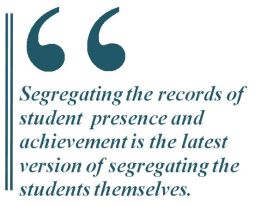Did an Alabama school board member really suggest that children with disabilities should be institutionalized?
No, she didn’t.
The board member actually said something quite different, and it’s important to get the facts straight on something that would appear so alarming. In the end, though, it doesn’t matter much. There is a central truth lost in the smokescreen, and it is this: There are schools in America that can simply choose not to serve students with disabilities. Providing special education services is expensive, to be sure, and as both versions of the story point out, when kids with disabilities are present in schools, so is the measure of their academic proficiency. In other words, kids with disabilities can lower a school’s average proficiency and affect its ranking against other schools. In the eyes of many districts and school boards, that creates a competitive disadvantage. And make no mistake, the competition is serious. A school’s funding levels and, in some cases, its very survival may be on the line.
 The Individuals with Disabilities Education Act (and its predecessor public law, 94-142) were intended to protect the educational rights and opportunities of students with disabilities. Specifically, the law can – and should – only apply to public schools, not private ones. In fact, “free and appropriate public education” is a cornerstone phrase of the original 1975 law. While many private schools would never dream of excluding children with disabilities and, in fact, do a spectacular job of creating an educational fabric for inclusion and academic success, many others do not. Worse, the fact that a significant percentage of these private schools are ‘faith-based’ parochial schools ought to be raising some serious ethical questions among their leadership. Can one truly claim a faith life that is inclusive of people with disabilities on Sunday morning, and exclusive of them Monday through Friday?
The Individuals with Disabilities Education Act (and its predecessor public law, 94-142) were intended to protect the educational rights and opportunities of students with disabilities. Specifically, the law can – and should – only apply to public schools, not private ones. In fact, “free and appropriate public education” is a cornerstone phrase of the original 1975 law. While many private schools would never dream of excluding children with disabilities and, in fact, do a spectacular job of creating an educational fabric for inclusion and academic success, many others do not. Worse, the fact that a significant percentage of these private schools are ‘faith-based’ parochial schools ought to be raising some serious ethical questions among their leadership. Can one truly claim a faith life that is inclusive of people with disabilities on Sunday morning, and exclusive of them Monday through Friday?
In an educational world in which the lines of funding and accountability are becoming blurry (as with many charter schools within the public system), this is a critical advocacy moment, one that must speak against the devaluing of people with disabilities. A decision to segregate the records of student presence and achievement may be the latest version of segregating the students themselves. It is a sign that we have yet to learn an essential truth: Disability is a normal part of the human condition.
